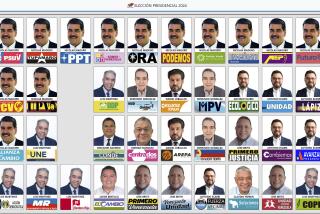Brazil’s ‘Teflon’ Leader Nicked by One Too Many Controversies
- Share via
SAO PAULO, Brazil — President Luiz Inacio Lula da Silva faces a tough runoff election this month after his stunning fall from prohibitive favorite to co-survivor in Sunday’s vote.
The charismatic Lula, whose cries of “I was betrayed!” seemed to carry him relatively unscathed through sundry other corruption cases, could not overcome a “dirty tricks” scandal that broke two weeks before the election and left many Brazilians appalled.
“The image of a shot in the foot is the blandest one that occurs to illustrate what Lula’s campaign did to the candidate Lula -- putting in high risk a reelection that was certain,” columnist Fernando de Barros e Silva wrote in Monday’s Folha de Sao Paulo newspaper.
Experts were divided Monday over whether Lula would even be the favorite in the Oct. 29 runoff against Geraldo Alckmin, 53, a conservative former Sao Paulo governor whose reputation as a bland technocrat invited the nickname “Chuchu,” for a nearly tasteless squash.
Most expect a bruising campaign, with more revelations from the scandals that have scarred Lula’s presidency and cost as many as two dozen of his top aides their jobs.
“This could be the end of the Lula period,” said David Fleischer, professor of political science at the University of Brasilia. “I had called him our Teflon president, but I think his Teflon wore a little thin, and people more or less lost faith with him.”
Alckmin offers a sharp contrast to Lula, 60, whose rise from factory worker to labor leader and then president is the stuff of Latin American legend. Alckmin, a physician by training and a professional politician, is relatively little known outside the financial capital of Sao Paulo.
Still, near-final results showed Alckmin trailed Lula by only 7 percentage points, garnering about 41.7 % of the vote compared with Lula’s 48.7%. Alckmin also clearly goes into the runoff with momentum.
This time around, Lula aides have promised that their man will not skip any televised debate, as he did in the last campaign, prompting criticism from many that he had grown aloof and out of touch.
Experts say the president probably will mount a more aggressive campaign centered around his strengths: his populist appeal to a broad swath of Brazilians and his government’s reputation for fiscal stability despite its leftist origins.
Even though he opposes many U.S. policies, Lula has sought warm relations with Washington, playing host to President Bush at a barbecue last year in Brazil, for example. He also is close to Venezuelan President Hugo Chavez, Washington’s chief antagonist in the region. Lula, however, has conspicuously avoided the strident Bush-bashing that so animates Chavez.
In the upcoming campaign, Alckmin seems likely to keep his emphasis on the integrity theme, pointing to Lula’s dented reputation. The president has weathered a series of exotically named scandals, but the so-called dossier affair appeared to exhaust many voters’ patience.
Last month, operatives of his Workers’ Party were apparently involved in a scheme to buy a dossier that sellers promised would link Alckmin’s party to a kickback plot known as the “bloodsuckers” scandal. Allegedly peddling the dossier for about $700,000 was a principal in the “bloodsuckers” case, which involved the sale of overpriced ambulances to local governments. Alckmin and party associates have denied wrongdoing.
The dossier affair touched a number of close Lula aides, including his campaign coordinator and a longtime bodyguard.
Previous scandals, including an alleged kickback scheme known as the “big monthly” -- after alleged monthly kickbacks -- have cost the jobs of other top aides, including Jose Dirceu, the president’s powerful ex-Cabinet chief, and former Finance Minister Antonio Palocci.
The drumbeat of controversy even appeared to sap the patience of some members of Lula’s base, the poor and working class.
“The last few years were a big deception, scandal after scandal,” said Otacilio Silva, 33, a doorman in Sao Paulo who voted for Lula in 2002 but not Sunday. “We had to show our discontent.”
But Lula still has considerable support, especially among the disadvantaged in a nation marked by vast economic disparities. Already there was a sense that the left would circle the wagons around the suddenly besieged president.
“Lula is accused of all these things, but weren’t those who were in power before also accused of bad things?” remarked Gustavo Costa, a waiter whose mother is among the many who survive on the Lula-backed family assistance plan of about $23 a month. “What is the difference?”
Many expect a hardening of feelings on both sides as election day approaches and incendiary rhetoric overwhelms debate.
“It is an illusion to imagine that the dispute ... will throw some light on problems and solutions for the country,” De Barros e Silva wrote in Folha de Sao Paulo. “The ... divisions between good and bad will become radicalized. The tone will be ‘Catch that thief!’ against ‘Coup-makers will not pass!’ ”
*
patrick.mcdonnell@ latimes.com
Special correspondent Marcelo Soares contributed to this report.
More to Read
Sign up for Essential California
The most important California stories and recommendations in your inbox every morning.
You may occasionally receive promotional content from the Los Angeles Times.










